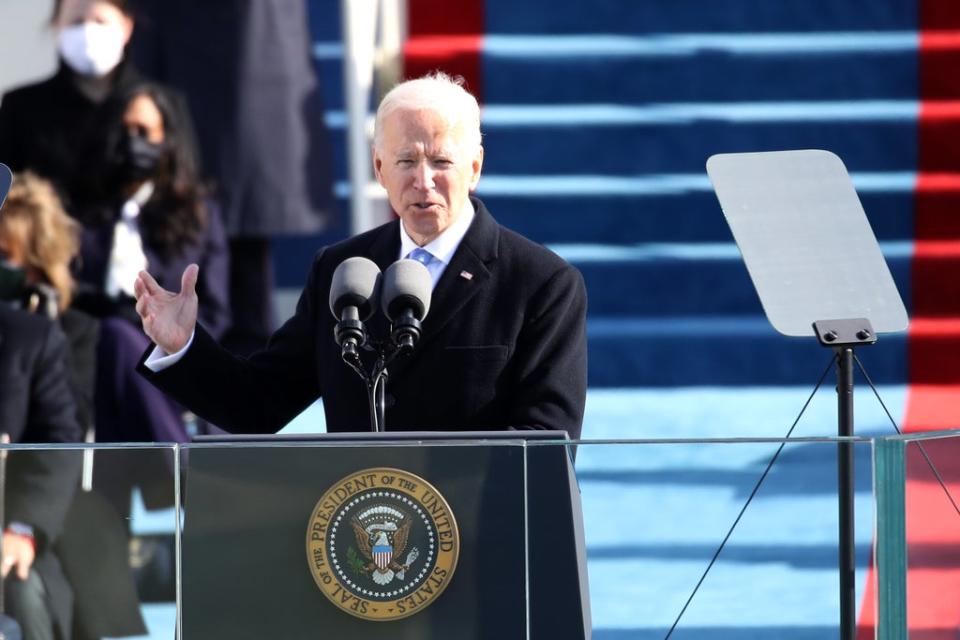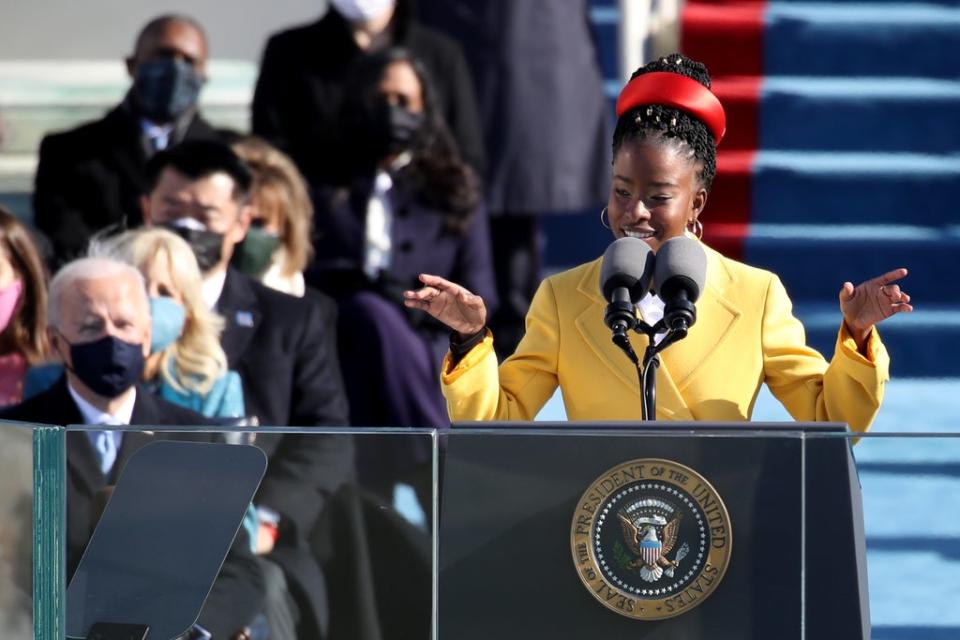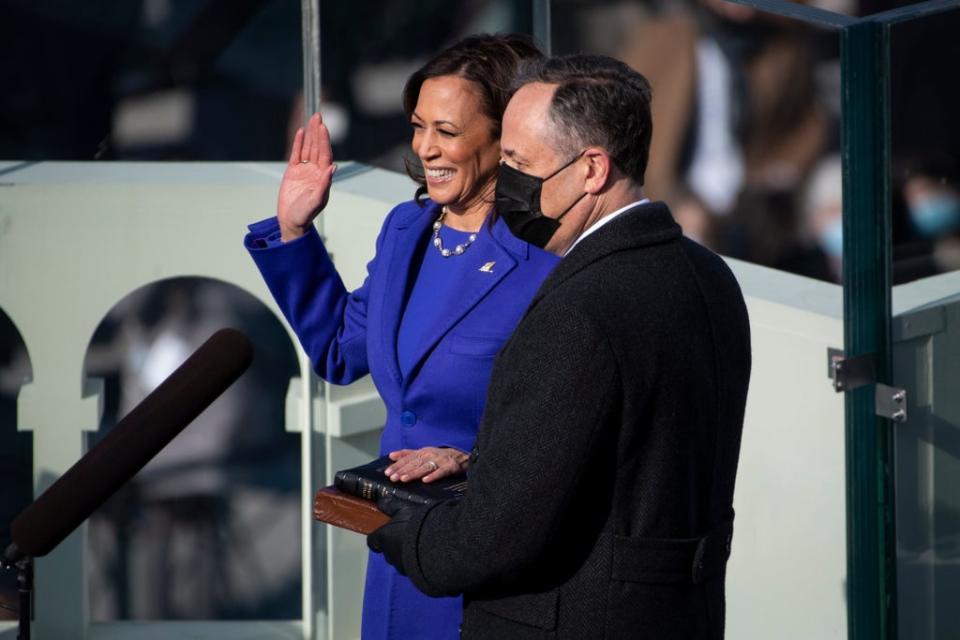Is the American public expecting too much from Joe Biden?’

It can somehow feel jolting to think back one year to Joe Biden’sInauguration Day.
The photographs show a blue sky over the US Capitol where he took the oath of office, but on the streets it seemed grey, cold and gloomy.
There were the dark green uniforms of the thousands of the National Guard troops, and the black uniforms of the DC and Capitol Police. They were a reminder that just two weeks earlier hundreds of supporters of Donald Trump had stormed the Congress, desperate to stop Biden becoming the 46th president. There was razor wire everywhere, and everyone appeared anxious.
The wind gusted at up to 40mph and as noon approached, there was snow flurries. (By then, Trump had already left town, refusing to acknowledge Biden’s win, and leaving Mike Pence in his place.)
The sigh of relief when Biden finally raised his hand and was sworn in was palpable.

“On this January day, my whole soul is in this: bringing America together, uniting our people, uniting our nation,” he said. “And I ask every American to join me in this cause.”
A year on, Biden is rightly being assessed on how well he has done in meeting those ambitions, to bring people together and restore what his supporters hoped would be a return to normalcy after four years of a Trump presidency that frequently felt anarchic, and a pandemic that would not release its grip.
At a White House press conference to mark those first 12 months, he was asked directly whether, given his low approval rating and legislative challenges, he had overpromised “to the American public what you could achieve in your first year in office”.
Biden responded firstly with a joke - “Why are you such an optimist!? - and then with a defence of his record.
“I didn’t overpromise, but I have probably outperformed what anybody thought would happen. The fact of the matter is that we’re in a situation where we have made enormous progress,” he said.
Indeed, for much of the almost two hours, Biden solidly defended his administration’s achievements - the creation of six million jobs, a programme that vaccinated 75 per cent of adults against the coronavirus, and measure that helped see child poverty drop by 40 per cent.
“I’m going to stay on this track,” he said. “I know there’s a lot of frustration and fatigue in this country. And we know why - Covid 19.”

He also took a shot at Republicans who had blocked his initiatives.
“I did not anticipate that there would be such a stalwart effort to make sure that the most important thing was that President Biden didn’t get anything done,” he said. “What are Republicans for?”
It is true that as he spoke Biden’s approval rating stood as low as 40 per cent. It is similarly the case there is little Democrats can do to stop Republicans winning control of the House of Representatives in November’s midterms, and possibly the Senate, though that happens to the party of almost every newly-elected president.
Away from the bubble of Washington DC – which, like every other nation’s centre of political power, obsesses over twist and turn of government – there is a broader prism through which to view Biden’s first year.
In March 2021 he signed into law a $1.9 trillion stimulus package, he has appointed a very senior official, John Kerry, to lead the US’s efforts to counter the climate crisis, he has repaired America’s relationship with its Nato allies, rejoined talks with Iran, drawn a firm line against Russia and China, and in November 2021 signed into law a $1 trillion infrastructure bill that had bipartisan support.
Given he now appears to recognise the need to break up his second infrastructure bill into pieces, he will probably get a deal on that too. The same goes for a measure on voting rights.
Biden has made plenty of errors. He misjudged the threat that the Delta variant would pose to efforts to reopen the country and the economy, making his July 4 proclamation that the US was close to “declaring our independence from a deadly virus” appear rather foolish.
On Afghanistan, his withdrawal of US troops, a policy he had long backed and was agreed to by Trump, turned into a chaotic shambles. His efforts to repair the damage done by Trump over immigration, appear to be stalled.
But what he has secured has been done with a Republican leader in the Senate, Mitch McConnell who brilliantly plays the role of spoiler, and the presence in the House of 150 or so Republican members of Congress who do not think Biden was legitimately elected.
(People call for the filibuster to be removed, but in truth the entire Senate is ripe for reform. Why in this age should political representation depend on land rather than people?)
What’s more, given a full third of Americans, and more than two-thirds of Republicans, accept Trump’s lies that Biden’s victory was illegitimate, it is easy to believe his approval rating might be even lower.
America can often feel like an anxious place in these times.
People worry about their jobs, the cost of living, the challenge of accessing affordable health care, educating their children, the safety of their streets, systemic racism, fundamental inequality.
All of these are very real. Sadly, they are all going to exist long after Joe Biden has left office. There are no easy fixes to any of these problems.
Yet, regardless of approval ratings, if one year ago, on Inauguration Day in the nation’s frigid, locked-down capital, Biden and his supporters had been asked would they have settled for what they secured so far, the answer most likely would have been a resounding “yes”.

 money
money 